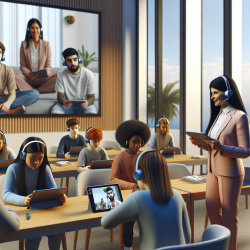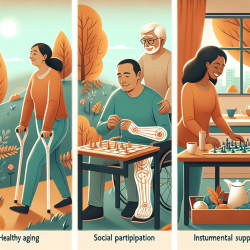Introduction
The COVID-19 pandemic has reshaped our world in countless ways, impacting not only our physical health but also our mental well-being. As a Special Education Director, it is crucial to stay informed and proactive in addressing the multifaceted challenges faced by students and staff. Recent research highlights the significant correlation between reduced physical activity and increased levels of depression and anxiety during the pandemic. This blog explores the implications of these findings and offers practical strategies for practitioners to enhance their skills and support their communities.
The Research Findings
The study titled "Reduced level of physical activity during COVID-19 pandemic is associated with depression and anxiety levels: an internet-based survey" conducted by Puccinelli et al. (2021) provides valuable insights into the mental health challenges exacerbated by the pandemic. The research involved 2,140 Brazilian participants and revealed that 30% experienced moderate to severe depression, while 23.3% reported moderate to severe anxiety symptoms. These mental health issues were closely linked to decreased physical activity levels, low family income, and younger age groups.
Implementing Research Outcomes
As practitioners, we have the opportunity to implement the outcomes of this research to foster a healthier and more resilient community. Here are some strategies to consider:
- Promote Physical Activity: Encourage students and staff to engage in regular physical activity, even within the constraints of social distancing. Virtual exercise classes, outdoor activities, and home-based workouts can be effective ways to maintain physical health.
- Integrate Mental Health Support: Provide access to mental health resources and counseling services. Encourage open conversations about mental health to reduce stigma and promote well-being.
- Collaborate with Families: Work closely with families to support their children's physical and mental health. Share resources and strategies for maintaining an active lifestyle at home.
- Leverage Technology: Utilize online platforms and apps to facilitate virtual physical activities and mental health support. This can include mindfulness exercises, virtual group workouts, and teletherapy sessions.
Encouraging Further Research
While the current research provides valuable insights, it is essential to continue exploring the complex relationship between physical activity and mental health. Practitioners are encouraged to engage in further research and collaboration to develop evidence-based interventions that address the unique needs of their communities.
Conclusion
The COVID-19 pandemic has underscored the importance of holistic approaches to health and well-being. By implementing the outcomes of recent research, practitioners can empower their communities to combat depression and anxiety through physical activity and mental health support. Together, we can create a more resilient and thriving educational environment.
To read the original research paper, please follow this link: Reduced level of physical activity during COVID-19 pandemic is associated with depression and anxiety levels: an internet-based survey.










